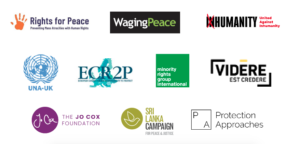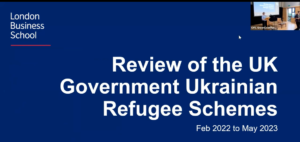by Martin Barber, Chair of UAI in the UK
As a friend recently put it in a blog, this extraordinary year has reinforced our isolation from our fellow human beings in other parts of the world. News bulletins have been dominated to a degree we would not have thought possible by discussion of a single topic.
One can almost feel the perpetrators of atrocities breathing a collective sigh of relief, as the spotlight is removed from them, allowing them to continue their murderous rampages with impunity.
In this context, UAI becomes ever more important. Too often, when the wars in Syria, Yemen, South Sudan and elsewhere do hit the headlines, the emphasis is only on getting aid to the victims. However important this is (and it is), it pales into insignificance alongside what could be achieved if the wars stopped, and the war criminals were brought to account.
As this report sets out, the Committee of UAI in the UK has pursued several initiatives in support of the overall goals of UAI set out in its Call to Action.
While UAI builds up its support networks and reaches out to new supporters to join our growing community, one of the most valuable services we can provide is to bring to the attention of UAI’s supporters, in our monthly newsletters, reports and analysis of atrocities being suffered by ordinary people which readers would not otherwise hear about.
In our two most recent newsletters, we looked, in May, at the horrendous situation in Tigray, Ethiopia, and in June, we highlighted several new or under-reported refugee situations, that demand our attention.
Colleagues sometimes ask me, what do you want us to do with this information? Here are some suggestions:
- Forward the information to your MP. At my request, in the past year, my MP wrote twice to the Secretary of State at the Foreign, Commonwealth and Development Office (FCDO), once to support our calls for justice for the victims of war crimes in Syria and once to demand an explanation for why the government had not pursued criminal charges against a British national, dismissed and repatriated by the UN for sexual abuse in the DRC.
- Share the information with friends, including on social media. Encourage them to sign up to receive our updates. The overall goal of UAI is for a community of citizens around the world to emerge that is large enough and strong enough to insist that governments take seriously their responsibilities to stop war crimes and crimes against humanity. Every additional voice added to this community helps to build up support for attaining this goal.
- Find out what the overseas charities you support are doing in the affected areas and encourage them to speak out against the atrocities their staff are witnessing.
- Take a look at what the major human rights organisations, like Amnesty or Human Rights Watch, are reporting on the situations we are highlighting.
- Bring to our attention situations that you think we should be investigating.
Activity reports
Monthly Newsletters
In September 2020, we produced UAI in the UK’s first monthly newsletter, in the form of a simple email, highlighting three situations of concern, and including links to in-depth assessments of the situations. This formula was generally well received and in early 2021, UAI’s International Executive Committee (IEC) invited UAI in the UK to convert this newsletter into one that goes to all supporters of UAI in every part of the world. So, since April 2021, we have been doing that.
We greatly welcome feedback on these newsletters. Please send comments to .
Criminalisation of the Asylum Process
One of the most shocking developments of recent years in Europe has been the growing tendency of governments to try and portray as criminals, people who go out of their way to bring help to desperate migrants and people seeking asylum. This criminalisation of what our societies have seen as a moral duty has received tacit acceptance by European institutions, although one component of the state – the judiciary – has in some situations stood up defiantly against this trashing of normative behaviour. We were pleased to encourage two young Irish law graduates, David Whelan and Euan Lindsay, to publish an interesting blog on Judicial Activism in France, where the Courts have refused to convict French citizens arrested for providing help to migrants arriving there. (See below for the link)
How Judicial activism challenged Fortress Europe in France – by David Whelan and Euan Lindsay
And we have continued our discussions with potential partners about a proposal to bring together academics, NGOs, diaspora communities, lawyers, and government officials to explore ways of ensuring that help can be provided to those who need it, without risk of prosecution.
Education in Emergencies
For a second year, UAI collaborated with a dynamic team of MBA students from London Business School (LBS) on a project focusing on the education needs of Syrian refugee children. This year the spotlight was on children living in Jordan. This project built on solid foundations from the LBS team in 2020 who had focused on potential digital tools for online learning. This year’s study focused on several of the main causes for children being out of school: lack of key infrastructure (physical and virtual); lack of support for children who have dropped-out of education; and lack of funding for education, particularly at secondary level. The team also highlighted the lack of opportunities in the workforce which could act as a disincentive for sending children to school when families have more immediate need for their children to work to supplement living expenses.
This was a challenging project to undertake with little publicly available information and in a fluid context of the global Covid -19 pandemic. The pandemic forced global school closures leaving over 103 million students out of the education system in the Middle East and North Africa, including 2.4 million learners in Jordan. Whilst the Ministry of Education sought to leverage various distance learning tools, refugee children lacked the hardware or wifi connectivity to enable them to make most use of these facilities. The Syrian refugee crisis continues for a tenth consecutive year, with over 230,000 registered school-age children currently living between host communities and refugee camps at huge risk of being left behind, in addition to a commensurately large number of undocumented refugees. Children living in temporary homes, already at great educational disadvantage, are now increasingly vulnerable. Although mitigating measures have been put in place, such as extended electricity hours at camps and data free access to the MOE website, significantly more attention and resources need to be devoted to ensure that the digital divide does not lead to an even larger learning and poverty divide.
Partnerships
At UAI in the UK we understand that we can usefully make common cause with other like-minded groups to expand our outreach and help them to reach new audiences.
- Atrocity Prevention Working Group
This group, hosted by Protection Approaches, brings together 25 specialised groups and individuals working to prevent atrocities in different parts of the world. In August 2020, UAI co-signed a submission to the UK Government’s Integrated Review of Security, Defence, Development, and Foreign Policy, recommending the adoption of a national atrocity prevention strategy, a proposal that was largely reflected in the Review when it was published in March 2021.
- Protection of Civilians Working Group
This group, hosted by Crisis Action, brings together several major UK-based NGOs delivering humanitarian aid in conflict situations. UAI worked with them on a comprehensive submission to the same Integrated Review. We joined the group in its dialogue with Ministers in the FCDO.
- CanDo
CanDo is a small charity bringing help to the people of Syria. In March 2021, they mounted a campaign to raise funds to install equipment in Syrian schools which would enable them to receive alerts about imminent attacks from the air.
Correspondence with UK Government
We have continued a regular correspondence with Ministers in the FCDO on issues of concern, including notably the importance of justice and accountability for the victims of atrocities in Syria and other conflict countries and the devastating impact of the cuts in the UK’s foreign aid budget on the lives of the most desperate civilians affected by war.
Volunteers and Universities
UAI International has recruited a part-time Communications Officer, Eleftheria Kousta, who is working with several volunteers to promote UAI among students at British universities. Anybody interested to join this group is welcome to contact Eleftheria at the following email address:
Membership and Supporters
UAI in the UK currently has 37 registered members and 228 supporters who receive our monthly newsletters and other announcements. Applications for membership are always welcome and there is currently no fee for membership.
The Committee
The members of the Committee over the past year have been:
Martin Barber, Chair
Gill Grunwald, Treasurer and Acting Secretary
Saba Al Mubaslat, Mark Bowden, and Lul Seyoum – Vice-Chairs
Sarah Beeching, Amina Khalid, Michael Mosselmans and Sara Palacios Arapiles – Members
30 June 2021










